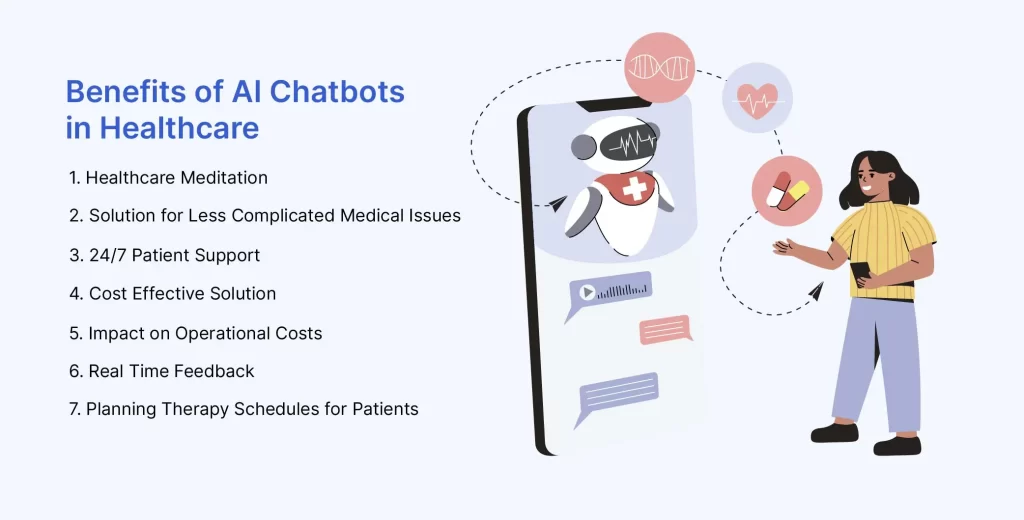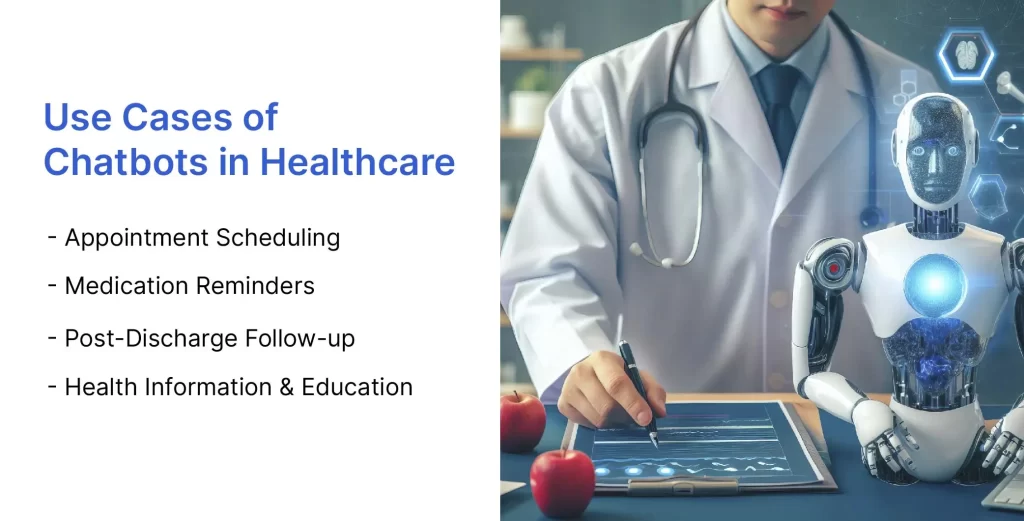When teams operate independently, it creates communication gaps that can lead to disorder. In contrast, when teams collaborate, they tend to be more efficient.
The market for healthcare chatbots was valued at $116.9 million globally in 2018 and is projected to grow at a compound annual growth rate (CAGR) of 14.5% from 2019 to $345.3 million by 2026.
In the ever-evolving landscape of healthcare, the integration of Artificial Intelligence (AI) chatbots has emerged as a transformative force, revolutionizing patient care, administrative processes, and overall healthcare management. Each and every second counts in the healthcare sector. Individuals do not want to stand in line or wait by the phone for a response from medical personnel. Healthcare providers need to be more astute in their customer service approach in this post-pandemic era. It is critical for the healthcare sector to keep ahead of the curve given the dread and vigilance the virus has instilled in patients. This leads them to the use of chatbots for healthcare. The healthcare sector has experienced significant advantages from chatbots. Aspects of healthcare such as prescription refills, symptom evaluation, appointment scheduling, and data aggregation have all been transformed by chatbots. However, chatbots’ use in healthcare goes far beyond these administrative duties. They significantly affect a great deal of other facets of healthcare.
Chatbots in healthcare are artificial intelligence (AI) applications designed to interact with users in a conversational manner, specifically tailored for the healthcare sector. These virtual assistants utilize natural language processing and machine learning algorithms to understand and respond to user queries or requests. In the healthcare context, chatbots serve a variety of purposes, ranging from providing medical information and appointment scheduling to offering medication reminders and symptom assessments.
Let’s explore the more nuanced ways in which chatbots are essential in the healthcare industry, even though they have demonstrated their value in many other domains.

The prompt administration of prescription drugs by medical professionals is essential to the treatment of the majority of illnesses. On the other hand, patients frequently have trouble keeping track of their medication intake and don’t take their prescriptions as prescribed. This may make treatment less effective.
Chatbots can be simply configured by healthcare providers to offer patients with prescription reminders. The chatbot reminds patients to take their medications on time and assists them in keeping track of their drug schedules. When a chatbot in the healthcare industry notices that a patient is mishandling their prescription, it can also step in and help.
The medical field is dealing with an enormous patient volume, which understaffed facilities are attempting to handle. The issue is that most people don’t know if they can get treatment at home or if their symptoms are serious enough to warrant a trip to the hospital. As a result, hospitals are overrun with patients, and doctors are overworked.
Chatbots can be used in the medical field to identify minor illnesses. Chatbots can be programmed to pose specific questions regarding symptoms that a patient has noticed, and they can also provide an initial diagnosis based on information provided by the user. Healthcare chatbots give patients all the information they need to treat and take care of themselves if their symptoms point to a condition that is easily addressed at home.
One of the most significant advantages of AI chatbots in healthcare is their ability to provide round-the-clock patient support. Patients can access information, schedule appointments, and receive immediate responses to their queries at any time, reducing wait times and ensuring continuous access to healthcare resources.
The implementation of AI chatbots stands out as a cost-effective and scalable solution, offering numerous advantages. These intelligent virtual assistants efficiently handle a substantial volume of inquiries and tasks, reducing the burden on healthcare staff and optimizing operational workflows. The scalability of AI chatbots allows healthcare providers to extend their reach, providing support and information to a large number of patients simultaneously.
The cost-effectiveness of AI chatbots is evident in their ability to streamline administrative processes, such as appointment scheduling and information dissemination, without requiring extensive human intervention. By automating routine tasks, these virtual assistants not only cut operational costs but also enable healthcare professionals to focus on more complex and specialized aspects of patient care.
The automation capabilities of AI chatbots result in reduced operational costs for healthcare businesses. By handling routine tasks and inquiries, chatbots free up human resources to focus on more complex and specialized aspects of patient care, ultimately improving cost-effectiveness.
Real-time feedback refers to the immediate and prompt collection, analysis, and response to feedback from users or customers as it happens. This type of feedback is valuable in various contexts, such as customer service, product development, and educational settings. Real-time feedback mechanisms enable organizations to swiftly address concerns, make timely improvements, and enhance the overall user experience.
In customer service, real-time feedback allows businesses to gauge customer satisfaction instantly. Whether through surveys, chat interactions, or social media, organizations can promptly address issues, acknowledge positive experiences, and adapt their strategies in response to immediate customer sentiments.
A crucial tool for treating people with mental health issues is therapy. But for therapy to be successful, patients must be able to attend their psychiatrist sessions on a regular basis.
Patients may frequently forget appointments or may be reluctant to make them because of difficulties like inefficiency.
Chatbots in healthcare have become valuable tools for enhancing patient engagement, providing quick access to information, and streamlining various processes. Here are some prominent use cases of how chatbots are making a significant impact in the healthcare industry:

In the industry of healthcare, chatbots excel at simplifying appointment scheduling. Patients can effortlessly book appointments, check availability, and receive timely reminders, all through a conversational interface. For instance, a hospital’s website integrated with a chatbot allows users to interactively schedule appointments, improving accessibility and reducing administrative burdens.
Enhancing medication adherence, chatbots deliver personalized reminders and dosage information. An example is Medisafe’s chatbot, which ensures patients stay on track with their medication schedules through interactive notifications and informative conversations.
Chatbots play a crucial role in post-discharge care, checking in with patients to monitor recovery. Conversa Health’s chatbot engages patients post-discharge, providing ongoing support, answering queries, and ensuring a smoother transition to home care.
Chatbots serve as valuable sources of medical information, offering users reliable details on conditions, treatments, and general health. WebMD’s chatbot, for instance, provides users with accurate health information, empowering them to make informed decisions about their well-being.
Chatbots streamline administrative processes, automating routine tasks like appointment bookings and billing inquiries. This not only reduces the manual workload on healthcare providers but also optimizes resources for more intricate aspects of patient care, leading to improved efficiency and cost-effectiveness. With 24/7 accessibility, chatbots provide continuous support, addressing patient queries and concerns in real-time, even during non-business hours. Equipped with intelligent algorithms, they assist in symptom checking and triage, ensuring a more efficient healthcare delivery system.
Revolutionizing appointment management, chatbots offer user-friendly interfaces for seamless bookings, rescheduling, or cancellations. This simplifies the administrative side of healthcare and enhances overall appointment management. Chatbot technology isn’t just an upgrade; it signifies a commitment to a more efficient, patient-centric, and data-informed approach to healthcare delivery.
According to analysts, the market for chatbots is expected to reach USD 943.64 million by 2030, reflecting the continued growth of this AI technology that gives patients an even more dependable, safe, and humanized experience. In the rapidly evolving landscape of healthcare, the integration of Artificial Intelligence (AI) chatbots has emerged as a transformative force, revolutionizing patient care, administrative processes, and overall healthcare management. In conclusion, the incorporation of AI chatbots in healthcare is transformative, offering benefits that extend beyond administrative efficiency to personalized patient care.
intellicoWorks excels in providing AI chatbot development services, ensuring seamless integration of advanced technology to enhance customer interactions and streamline business processes. Having this technological evolution is not just a necessity; it’s an opportunity for healthcare providers to thrive in a dynamic and patient-centric era. The future of healthcare is here, and AI chatbots are leading the way.
In the healthcare industry, chatbots are here to stay and are not a passing trend. Their versatility has allowed them to change people’s perceptions of contemporary healthcare in a number of fascinating ways, and they still do. The strategic integration of AI for industries empowers companies to unlock new insights, improve decision-making, and drive transformative changes across diverse sectors.intellicoWorks excels in providing AI chatbot development services, ensuring seamless integration of advanced technology to enhance customer interactions and streamline business processes.
Leverage AI Chatbots in Healthcare! Transform Operations and Elevate Patient Care.
Follow IntellicoWorks for more insights!

Talk to us and let’s build something great together
A Subsidiary of Vaival Technologies, LLC
IntelliCoworks is a leading DevOps, SecOps and DataOps service provider and specializes in delivering tailored solutions using the latest technologies to serve various industries. Our DevOps engineers help companies with the endless process of securing both data and operations.
Ops
Cloud
AI & ML
Copyrights © 2023 byIntellicoworks. All rights reserved.